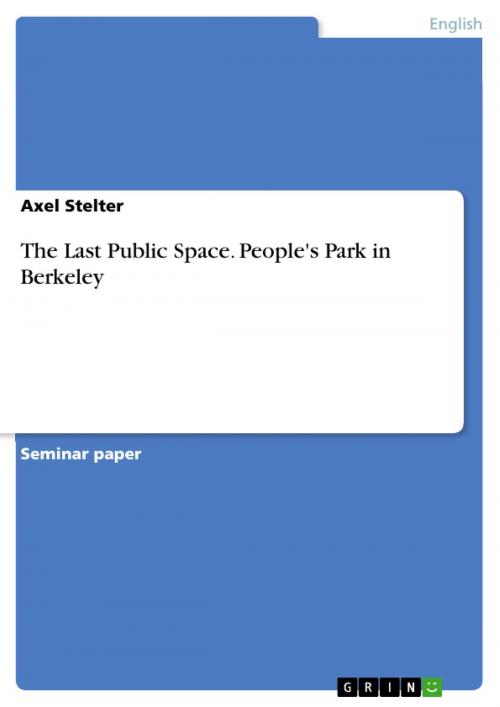| Author: | Axel Stelter | ISBN: | 9783640241125 |
| Publisher: | GRIN Verlag | Publication: | January 12, 2009 |
| Imprint: | GRIN Verlag | Language: | English |
| Author: | Axel Stelter |
| ISBN: | 9783640241125 |
| Publisher: | GRIN Verlag |
| Publication: | January 12, 2009 |
| Imprint: | GRIN Verlag |
| Language: | English |
Seminar paper from the year 2008 in the subject American Studies - Culture and Applied Geography, grade: A, University of California, Berkeley , 9 entries in the bibliography, language: English, abstract: During the violent turbulences of the Free Speech Movement in the 1960s, about 100 Berkeley residents captured a piece of corporate land, owned by the University of California, at 2100 Haste Street. They brought flowers, trees, shovels and food to the site. The people of Berkeley built themselves a park on a piece of land which did not belong to them and simply justified their actions to the city and university with the words: 'We are using the land better than you used it: It's ours!'(Frank Bardacke). Besides the political impact of this event, the residents of Berkeley created a public space out of corporate land with their own hands and their own ideas. Their park was supposed to symbolize everything they had fought for in the last decade, especially the right to free speech and their idea of the equality of all humans. The idea that all humans, whether black or white, rich or poor, should be treated and seen equally lives on the idea of a public park like the People's Park in Berkeley. Public spaces in generally defined as areas or places that can be accessed by all people. There are no restrictions on gender, race or socio-economic status. Public spaces do not require any permission or fees to be entered. Many streets, parks and public buildings are public spaces. [...]
Seminar paper from the year 2008 in the subject American Studies - Culture and Applied Geography, grade: A, University of California, Berkeley , 9 entries in the bibliography, language: English, abstract: During the violent turbulences of the Free Speech Movement in the 1960s, about 100 Berkeley residents captured a piece of corporate land, owned by the University of California, at 2100 Haste Street. They brought flowers, trees, shovels and food to the site. The people of Berkeley built themselves a park on a piece of land which did not belong to them and simply justified their actions to the city and university with the words: 'We are using the land better than you used it: It's ours!'(Frank Bardacke). Besides the political impact of this event, the residents of Berkeley created a public space out of corporate land with their own hands and their own ideas. Their park was supposed to symbolize everything they had fought for in the last decade, especially the right to free speech and their idea of the equality of all humans. The idea that all humans, whether black or white, rich or poor, should be treated and seen equally lives on the idea of a public park like the People's Park in Berkeley. Public spaces in generally defined as areas or places that can be accessed by all people. There are no restrictions on gender, race or socio-economic status. Public spaces do not require any permission or fees to be entered. Many streets, parks and public buildings are public spaces. [...]















